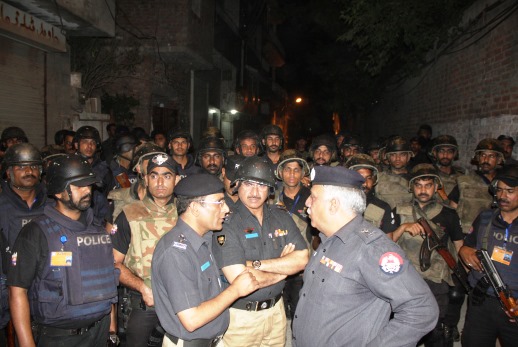
Twenty-year-old Yaqoob Bashir Masih was accused of desecrating the Quran in Mirpur Khas in Sindh province on June 4, even though he has been treated for his mental health, according to a Catholic priest.
After Bashir (a Christian, known locally as ‘Kaka’) is said to have told a crowd who threatened to set fire to him that he burned and buried a Quran, a further mob gathered and locked him into a house.
Local Christians fled, fearing a riot.
Police later took Bashir into custody and are reported to be currently investigating charges against him.
Mushtaq Masih, Bashir’s next-door neighbour in the Mehmoodabad area, told World Watch Monitor how the incident unfolded:
“It was around 7 p.m. and I was sitting with my wife on our camel cart. We were discussing how earning our daily living had become so tough when we started hearing the noise of a group of a people.
“I heard Yaqoob’s’s elder brother asking him ‘Where is the copy of the Quran which the cleric gave you this morning?’
Doused with kerosene
“Yaqoob was not telling them, and he kept naming a few other neighbours… The mob were severely beating him, but Yaqoob did not tell them where the Quran was. In the end, some of them doused him with kerosene oil and told him that they would be set him on fire if he would not tell them. Then he told them that he had burned it in the morning and then buried it.”
Some locals reported that “Yaqoob used to go to the cleric, who had told him that his mental condition would improve if he recited the Quran.”
Mushtaq went on: “That morning Yaqoob requested the cleric to give him the copy of the Quran, saying that his two sisters would read it to him. But rather than bringing it home, he burned it.”
It was reported that a few students of a nearby madrassah (an Islamic seminary) had seen him burning the Quran, after which they informed a cleric.
Mushtaq explained: “About two years ago Yaqoob had started learning ‘black magic’ and since then, he sometimes acted quite erratically. Most of the time he was fine but sometimes he behaved as if he had no control over himself.”
“For instance, his mother told the crowd that only three days before the incident, Yaqoob had torn the Bible into four pieces and thrown it on the floor.
“The police were informed of Yaqoob’s confession and they arrived to arrest him. But still a mob was gathering”.
Mehmoodabad Police Station House Officer Muhammad Dawood told World Watch Monitor:
“After Yaqoob confessed to committing the crime, the mob locked him in a house and informed the police. He also confessed to us and sought forgiveness. But I told him that he should seek Allah’s forgiveness as no man could forgive him….
Christians fled the area
(Later) three police vans were installed there. But, fearing an attack, all the Christians had fled the area.”
Neighbour Mushtaq who fled to Karachi – from where he spoke to us – added: “At about 1 a.m. that night, the police told us to leave our area because more than 200 people were still chanting slogans, demanding that they should burn our colony – so then we fled the area.”
Catholic priest Father Abid Habib confirmed to World Watch Monitor that Yaqoob had received treatment for mental illness from a mental health facility in Hyderabad.
“A local cleric had promised him that he would be cured through the recitation of the Holy Quran.
“Some say that he was also a drug addict and was under the influence of hashish when he committed the act of desecration,” added the priest.
“A mob was chanting slogans against Christians – but we thank the police and the Rangers, who brought the situation under control. I visited the area next day, but all the Christians had fled it by then.”
The priest added: “The first information report [no. 41/15] had been registered against Yaqoob and he behaved normally, and even told the magistrate that he was sorry for committing the crime.”
In Pakistan’s blasphemy laws, under which comes desecration of the Quran, there is allowance of exemption if an offender can prove ‘lack of mental capacity’ as there would be in many other countries.
The Sindh provincial government strengthened this law in April, making it mandatory for a psychiatrist to assess anyone accused of blasphemy, or who tries to kill him/herself.

Two weeks ago, we reported
on another case in which Humayun Faisal was accused of desecrating the Quran in Lahore, in Punjab province: he was well-known in the area as having severe mental health problems, and as a drug addict.
Even though the 30 year old Faisal was (like Yaqoob) taken into police custody, a crowd of about 300 gathered in the small Christian neighbourhood to protest against his alleged act. The Rangers and the police were called in to bring the tense situation under control. Police later charged Faisal with desecration of the Quran, punishable with life imprisonment (in Pakistan that means 25 years).
Christian sentenced to death for murder, aged 15, hung after 22 years on death row
Meanwhile on Wednesday, June 10th, Pakistan hung a 37 year old Christian, Aftab Nazir Bahadur, who’d allegedly confessed to double murder when he was 15 years old in 1992. He was convicted on the evidence of two witnesses, both of whom recently retracted their accounts, saying they had implicated Bahadur after police tortured them.
“This is a truly shameful day for Pakistan’s justice system. Aftab was subjected to almost every injustice conceivable,” said Maya Foa, director from international human rights group Reprieve.
“To the last, Pakistan refused even to grant his lawyers the few days needed to present evidence which would have proved his innocence. This is a travesty of justice, and tragedy for all those who knew Aftab,” she added.
A recent book ‘Blasphemy Law and Religious Freedom” by Prof. Shahid Mobeen reports that at least 13 Christians (including Aasiya Noreen Bibi) are on death row on blasphemy convictions.
Moubin, of the Pontifical Lateran University in Rome, says the Pakistani blasphemy law criminalises all behaviour considered offensive to the Quran or the Prophet Muhammed.
The academic says that over the past 25 years, this law was applied more than 1,000 times and Christian minorities have suffered from this more than others.